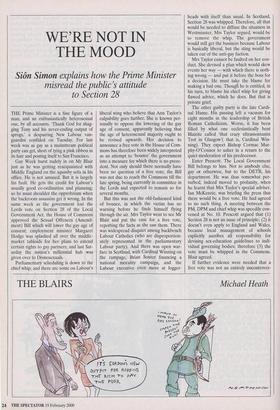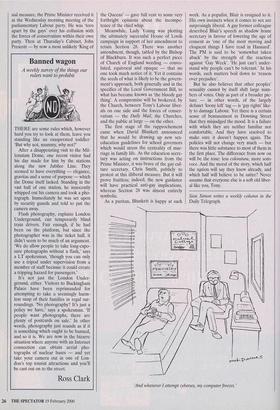WE'RE NOT IN THE MOOD
SiOn Simon explains how the Prime Minister
misread the public's attitude to Section 28
THE Prime Minister is a fine figure of a man, and an enthusiastically heterosexual one, by all accounts. 'Thank God for shag- ging Tony and his never-ending output of sprogs,' a despairing New Labour van- guardist confided on Tuesday. For last week was as gay as a mainstream political party can get, short of tying a pink ribbon in its hair and posting itself to San Francisco.
Gay Week burst rudely in on Mr Blair just as he was getting reacquainted with Middle England on the squashy sofa in his office. He is not amused. But it is largely his fault. He gets the credit for Labour's usually good co-ordination and planning; so he must shoulder the opprobrium when the backroom assassins get it wrong. In the same week as the government lost the Lords vote on Section 28 of the Local Government Act, the House of Commons approved the Sexual Offences (Amend- ment) Bill which will lower the gay age of consent; employment minister Margaret Hodge was splashed all over the middle- market tabloids for her plans to extend certain rights to gay partners; and last Sat- urday the nation's millennial hub was given over to Domosexuals.
Parliamentary scheduling is down to the chief whip; and there are some on Labour's liberal wing who believe that Ann Taylor's culpability goes further. She is known per- sonally to oppose the lowering of the gay age of consent, apparently believing that the age of heterosexual majority ought to be revised upwards. Her decision to announce a free vote in the House of Com- mons has therefore been widely interpreted as an attempt to 'bounce' the government into a measure for which there is no prece- dent. Not only should there normally have been no question of a free vote; the Bill was not due to reach the Commons till the late spring, being currently in committee in the Lords and expected to remain so for several months.
But this was not the old-fashioned kind of bounce, in which the victim has no warning before he finds himself flying through the air. Mrs Taylor went to see Mr Blair and put the case for a free vote, reporting the facts as she saw them. There was widespread disquiet among backbench Labour Catholics (who are disproportion- ately represented in the parliamentary Labour party). And there was open war- fare in Scotland, with Cardinal Winning on the rampage, Brian Souter financing a national morality campaign, and the Labour executive even more at logger- heads with itself than usual. In Scotland, Section 28 was whipped. Therefore, all that would be needed to diffuse the situation in Westminster, Mrs Taylor argued, would be to remove the whip. The government would still get the business because Labour is basically liberal, but the sting would be taken out of the anti-gay faction.
Mrs Taylor cannot be faulted on her con- duct. She devised a plan which would skew events her way — with which there is noth- ing wrong — and put it before the boss for a decision. He must take the blame for making a bad one. Thougli he is entitled, in his turn, to blame his chief whip for giving flawed advice, which he does. But that is private grief.
The other guilty party is the late Cardi- nal Hume. His passing left a vacuum for eight months in the leadership of British. Roman Catholicism. Worse, it has been filled by what one ecclesiastically bent Blairite called 'that crazy ultramontanist Trot in Glasgow'( that is, Cardinal Win- ning). They expect Bishop Cormac Mur- phy-O'Connor to usher in a return to the quiet moderation of his predecessor.
Enter Prescott. The Local Government Bill belongs to him. Not to anybody else, gay or otherwise, but to the DETR, his department. He was thus somewhat per- turbed, indeed moved to profanity, when he learnt that Mrs Taylor's special adviser, Ian McKenzie, was briefing the press that there would be a free vote. He had agreed to no such thing. A meeting between the PM, DPM and chief whip was speedily con- vened at No. 10. Prescott argued that (1) Section 28 is not an issue of principle; (2) it doesn't even apply to England and Wales, because local management of schools explicitly ascribes all responsibility for devising sex-education guidelines to indi- vidual governing bodies; therefore (3) the vote must be whipped in the Commons. Blair agreed.
If further evidence were needed that a free vote was not an entirely uncontrover- sial measure, the Prime Minister received it at the Wednesday morning meeting of the parliamentary Labour party. He was 'torn apart by the gays' over his collusion with the forces of conservatism within their own party. Then at Thursday's Cabinet, John Prescott — by now a most unlikely 'King of the Queens' — gave full vent to some very forthright opinions about the incompe- tence of the chief whip.
Meanwhile, Lady Young was plotting the ultimately successful House of Lords campaign in support of her amendment to retain Section 28. There was another amendment, though, tabled by the Bishop of Blackburn. It was such a perfect piece of Church of England wording — convo- luted, equivocal and opaque — that no one took much notice of it. Yet it contains the seeds of what is likely to be the govern- ment's approach, both generally and in the specifics of the Local Government Bill, to what has become known as 'the bloody gay thing'. A compromise will be brokered, by the Church, between Tony's Labour liber- als on one side and the forces of conser- vatism — the Daily Mail, the Churches, and the public at large — on the other.
The first stage of the rapprochement came when David Blunkett announced that he would be drawing up new sex- education guidelines for school governors which would stress the centrality of mar- riage in family life. As the education secre- tary was acting on instructions from the Prime Minister, it was brave of the gay cul- ture secretary, Chris Smith, publicly to protest at this illiberal measure. But it will prove fruitless; indeed, the new guidance will have practical anti-gay implications, whereas Section 28 was almost entirely symbolic.
As a puritan, Blunkett is happy at such work. As a populist, Blair is resigned to it. His own instincts when it comes to sex are surprisingly liberal. A gay former colleague described Blair's speech as shadow home secretary in favour of lowering the age of consent as 'one of the most moving and eloquent things I liave read in Hansard'. The PM is said to be 'somewhat taken aback' by the strength of the reaction against 'Gay Week'. 'He just can't under- stand why people can't be tolerant.' In his words, such matters boil down to 'reason over prejudice'.
But he also believes that other peoples' sexuality cannot by itself shift large num- bers of votes. Only as part of a broader pic- ture — in other words, of the largely defunct 'loony left' tag — is 'gay rights' like- ly to damage Labour. Yet there is a certain sense of bemusement in Downing Street that they misjudged the mood. It is a failure with which they are neither familiar nor comfortable. And they have resolved to make sure it doesn't happen again. The policies will not change very much — but there was little substance to most of them in the first place. The difference from now on will be the tone: less coloratura, more sotto voce. And the moral of the story, which half the *Lion will say they knew already, and which half will believe to be satire? Never assume that everyone else is a soft old liber- al like you, Tony.
Sion Simon writes a weekly column in the Daily Telegraph.
And whenever I attempt cybersex, my computer freezes.'



































































 Previous page
Previous page